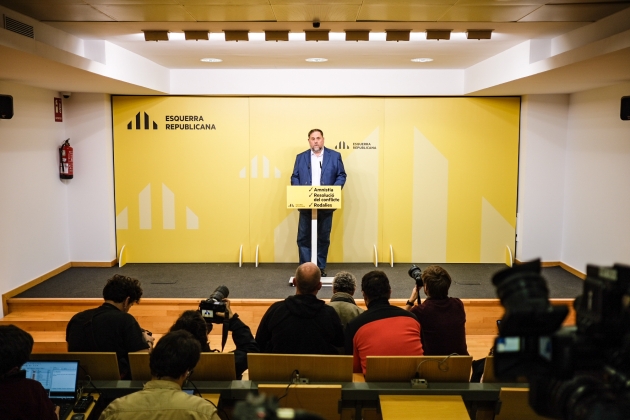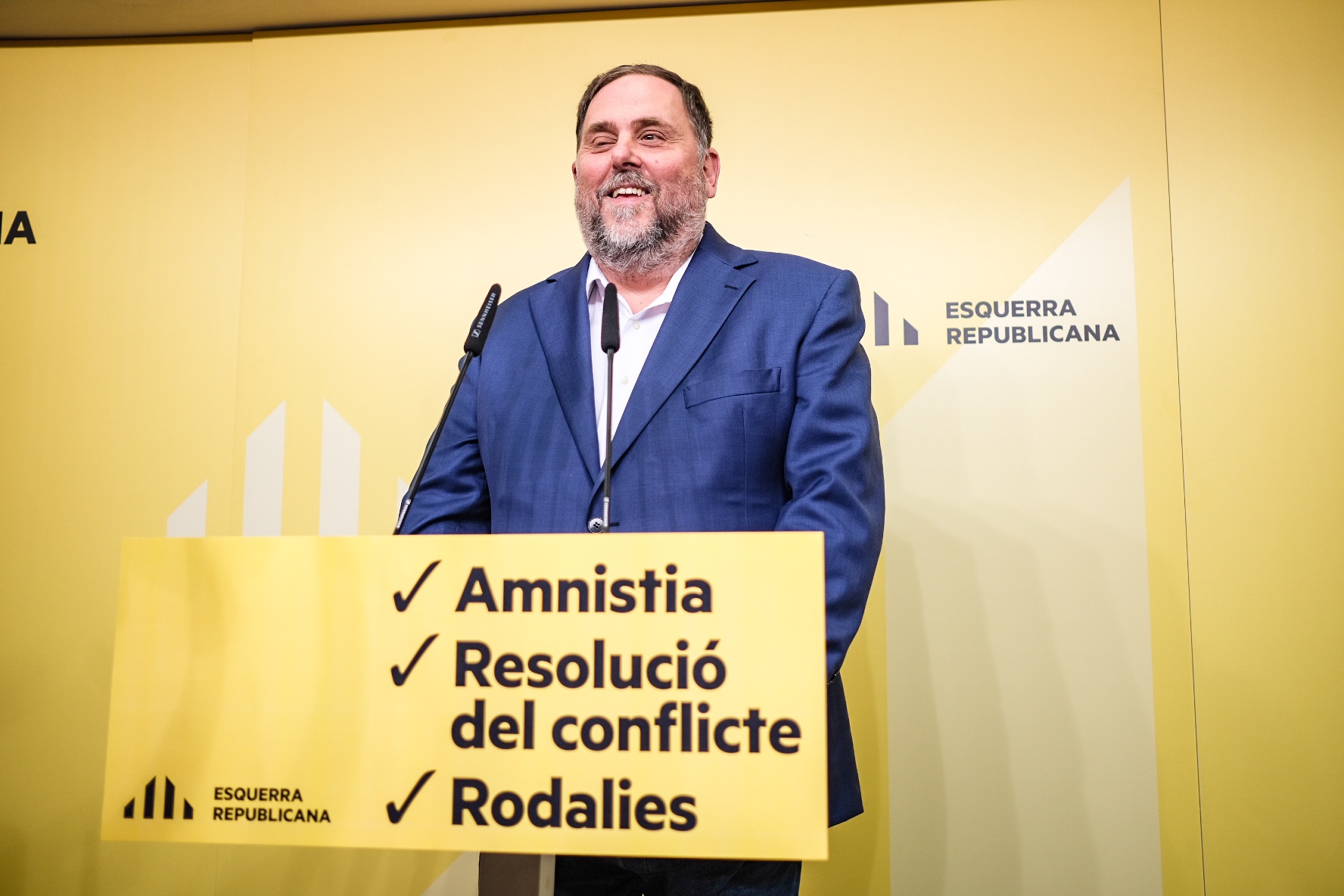Oriol Junqueras appeared this Thursday at the headquarters of the Catalan Republican Left (ERC) minutes after sealing his party's pact with the Socialists (PSOE) under which they will vote for the investiture of Pedro Sánchez as leader of a new Spanish government. "Today Catalonia wins", announced the leader of the Republicans as he set out the details of the pact with the Socialists, which includes the complete transfer of the Rodalies rail service through a new company called Rodalies de Catalunya, an amnesty "for everyone, without exceptions or exclusions", the forgiveness of part of Catalonia's debt by the Spanish government and also the continuation of the dialogue table between the Catalan and Spanish governments aiming to resolve the political conflict. Thus, ERC believes that it has satisfied the "three folders" which it had declared as critical in order to vote 'yes' to Pedro Sánchez as prime minister: the amnesty, public well-being and also progress in the resolution of the political conflict. On the lectern from which Junqueras spoke, these three concepts were listed as bullet points, each with a tick beside it.

A table between the governments and with a "recognized verifier"
"Catalonia wins in the political negotiation with the continuity of the dialogue table to advance on the path of putting the future of our country in the hands of the citizens" with a referendum on self-determination, argued Junqueras, who added that the agreement with the PSOE also includes the figure of a verifier "of recognized prestige who will monitor and act as guarantor for the agreements and methodologies". Specifically, the agreement signed by the Socialists and the Republicans includes an accord on "ratifying and promoting institutional dialogue between governments on the political future of Catalonia through political and institutional dialogue through the Table for Dialogue, Negotiation and Agreement". This, once the amnesty law has been agreed, will go through a "phase of approaches, analysis and dialogue on political proposals on the matter". However, the agreement does not set any date for a new meeting of this body, since Junqueras has pointed out that it is up to the governments and not the parties to agree on it. The last time this board met was at the end of July 2022.
The ERC president reiterated this idea, insisting that the negotiation between the Spanish state and Catalonia must be between governments because they are the institutions that represent the citizens, and that it must be used to "establish the necessary conditions so that Catalan citizens can decide on their future." On the possibility of opening a table among the Catalan parties, Junqueras commented that this dialogue is already taking place in the Parliament of Catalonia.
The continuity of the legislature, in the hands of the PSOE
Although the Socialists want a deal that goes beyond backing the formation of a Pedro Sánchez-led government in order to guarantee stability during the legislature, Junqueras cooled these expectations by remarking that it is only a pact for the seven ERC deputies to give their yes to Pedro Sánchez when the investiture vote is held. "As long as there is continuity in the fulfillment of the pacts made and in the will to reach new agreements, it will be easier for the legislature to have continuity. Everything will depend on whether the will expressed today is maintained during the legislature," Junqueras stated. The ERC president also added that, for now, the party's guarantee that the PSOE will comply with the agreements signed, including the transfer of Rodalies, is its own need: "The Socialist Party often has to be forced to make agreements", reflected Junqueras, quoting Gabriel Rufián: "If it were up to them [ie, the PSOE], the negligence with which they have treated Catalan society and its economy would continue unchanged".
The message from Junqueras to Junts
On this key Thursday in the negotiations for the investiture, the ERC leadership met to assess the agreements, finally endorsing them although the last word is now in the hands of the members, who have to validate the deal made in an electronic consultation this Friday. However, the leadership of Together for Catalonia (Junts) did the same thing in Brussels and that meeting, by contrast, did not end up closing the pact with the PSOE, due to differences over the amnesty law. Asked about this issue, Junqueras asked for "everyone to put the same will" into the reaching of agreements. "That there is an amnesty is good from all points of view: that there is a reduction of Catalan debt as well, a commitment to finance the Mossos d'Esquadra and security policies as well. We want to think that all the political spaces in the country are working in the same direction as us and helping to make all of this go well", he concluded.
Rodalies: a new rail management firm
The agreement that the PSOE and ERC have concluded includes the long-demanded transfer to Catalan control of the Rodalies rail services, responsible for commuter lines and other intra-Catalonia trains. The formula under which this is to take place involved the creation of a new company, under the name of Rodalies de Catalunya, which will have a board of directors comprising equal numbers appointed by the Spanish state and by the Generalitat, but with a president appointed by the Catalan government, who will have a casting vote. Rodalies appears in Annex 1 of the agreement, in which commitments and deadlines are set out for the gradual transfer of at least part of the R-1, R-2 and R-3 lines. Spanish presidency minister Felix Bolaños asserted this Thursday that this agreement is nothing more than the culmination of the process that began in 2009 and 2010. Although the Catalan government appointees on the board will have a theoretical majority with the president's casting vote, agreements considered strategic in relation to the service will have to be adopted by a larger majority of board members.

